Russia’s melancholy oligarchs
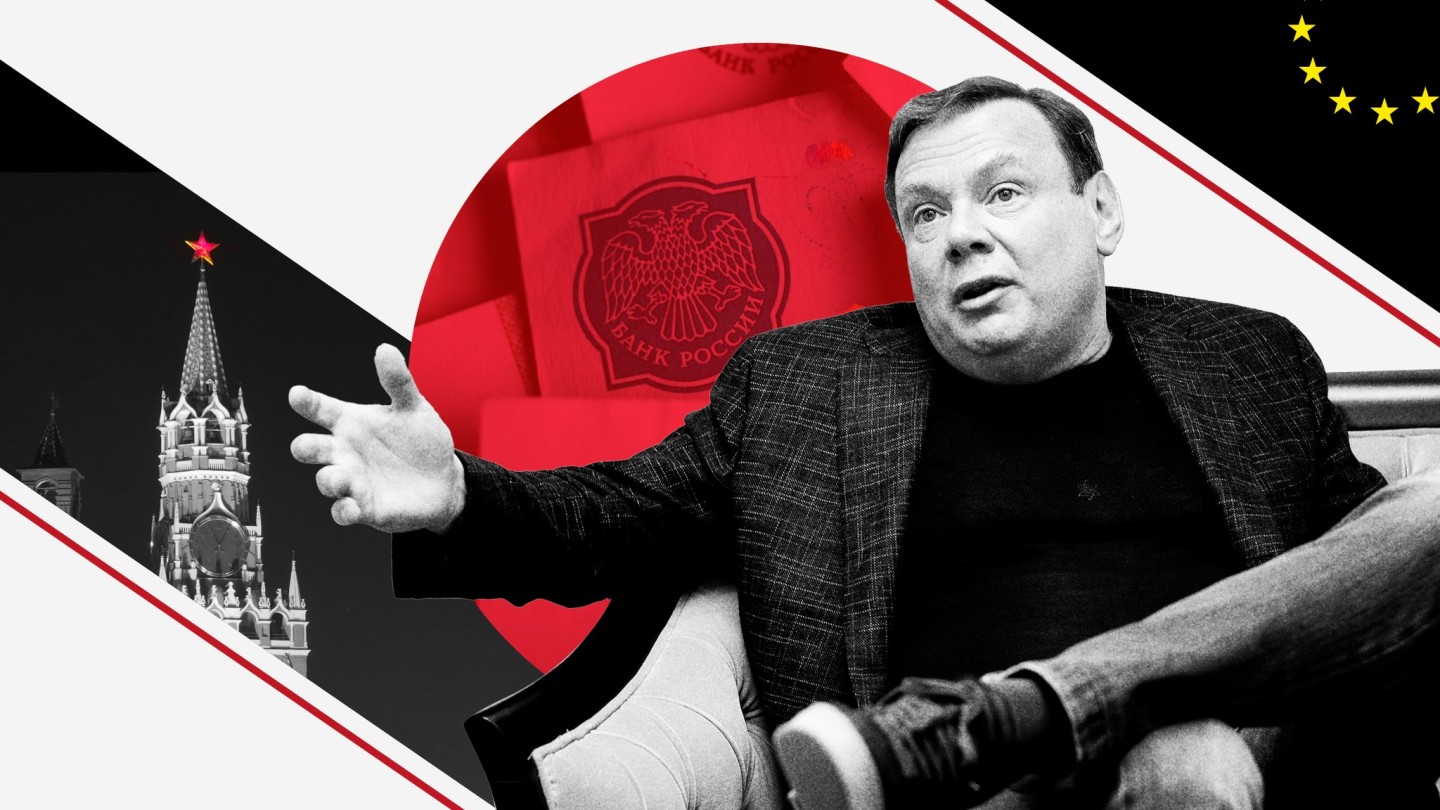
Simply sign up to the War in Ukraine myFT Digest -- delivered directly to your inbox.
As Russia’s invasion of Ukraine raged this spring, the billionaire oligarch Mikhail Fridman called Kristina Kvien, then the US’s most senior envoy to Kyiv, with a proposal.
Fridman — who grew up in Lviv, in western Ukraine, but has Russian and Israeli passports and made most of his estimated $13bn fortune in Russia — would donate part of his wealth towards repairing damage from the war.
In return, the US would help him avoid the sanctions that were being imposed on oligarchs, which western policymakers hoped would force them to break with Russian president Vladimir Putin.
After Kvien raised questions about Fridman’s proposal, the conversation quickly became heated, according to three people familiar with the matter. Fridman began shouting and swearing at Kvien and insisted that he had no power to influence Putin.
“He spoke of his love of his native Ukraine,” says one of the people. “But then he went emotional, definitely. ‘You want to take away all my money!’”
Kvien told Fridman their conversation was over and hung up the phone. Fridman wrote Kvien a text message to apologise, but received no response.
The state department said it would not comment on “diplomatic discussions”. Fridman has denied that he ever spoke to Kvien, lobbied the US to help him avoid sanctions or offered to help Ukraine’s reconstruction efforts.
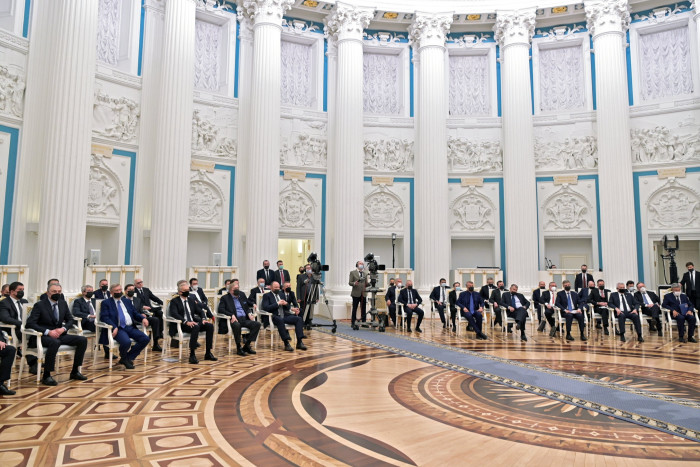
Since Putin launched the invasion of Ukraine, dozens of Russian tycoons have had their western bank accounts frozen and some have been forced to give up their stakes in western companies and lost their Mediterranean mansions.
But six months later, there is little sign that the sanctions have pressured the oligarchs into starting a “palace coup” against Putin.
Instead, they have had a very different impact. Increasingly angry at western governments, Russia’s oligarchs are scrambling for ways to cling on to what remains of their wealth — including through the sorts of buyout proposals that Fridman presented.
Many of the oligarchs who once enjoyed spending time in the west are now resigned to returning to Russia. Those in Moscow have quietly accepted their diminished status in a country at war.
Through interviews with seven Russian tycoons under sanctions — as well as senior bankers, current and former senior executives at major companies, ex-officials, and friends and family — the picture that emerges is of a group of oligarchs opposed to Putin’s war and resentful that it has ruined their fortunes. However, they are also simultaneously embittered at the west, which they believe has scapegoated them for events beyond their control.
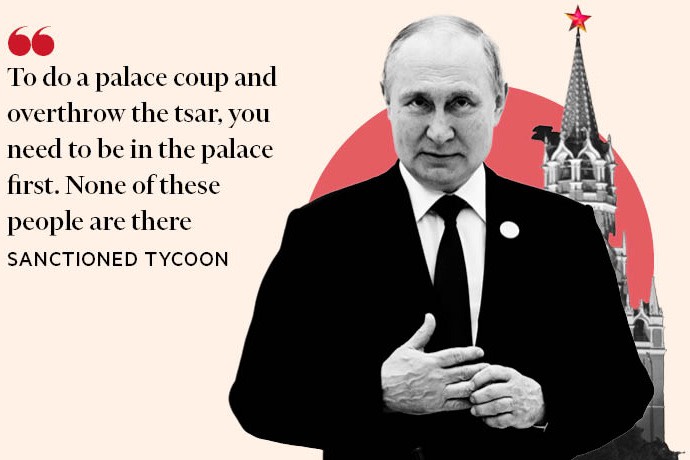
“To do a palace coup and overthrow the tsar, you need to be in the palace first. None of these people are there,” says one Russian businessman under sanctions. “How is Fridman supposed to affect the president’s decisions from the UK? And if Fridman was in his house in Moscow, he still wouldn’t have any contact with the president. How could he affect his decisions?”
At least 21 Russian businessmen are now suing the EU in an effort to overturn sanctions against them, according to filings at the European Court of Justice in Luxembourg and people familiar with the matter.
Privately, some admit that these legal actions may not be enough to win them back their assets in the west.
Yet many are set on challenging the sanctions to the end — most notably Fridman and his business partner Petr Aven, who both became notorious for waging brutal courtroom battles, ranging from the City of London to the oilfields of Siberia.
“The guys are really pissed off and frustrated,” says a senior banker, who knows the two oligarchs well. “They are energetic people and fighters but it’s a very difficult fight.”
Escaping the Kremlin’s eye
Just months after he first took office in 2000, Putin gathered the country’s most prominent oligarchs in the Kremlin’s ornate Hall of the Order of St Catherine to explain the new rules by which business would operate in his Russia. They could keep the fortunes they amassed in often murky privatisations, he told them, as long as they stayed at “arm’s length” from politics.
When he summoned a group of leading oligarchs to the same room on the day of the invasion of Ukraine in February, Aven was one of only two members of the semibankirschina — the seven bankers who funded Boris Yeltsin’s re-election as president in 1996 — still in the country. Others, who had challenged Putin, were long gone: some in exile, like former oil baron Mikhail Khodorkovsky, or dead, like Boris Berezovsky.
The televised tirade at the businessmen meekly lined up in alphabetical order was a sign of how subservient they have become during Putin’s two decades in the Kremlin.
Of all the oligarchs, Fridman and Aven had done the most to establish themselves in the west. Backed by fortunes made in Russia’s oil, banking, retail and telecoms industries, they set up private equity firm LetterOne in London in 2013, creating a new empire in Europe that includes UK health food retailer Holland & Barrett, German energy group Wintershall Dea and Spain’s Dia supermarket.
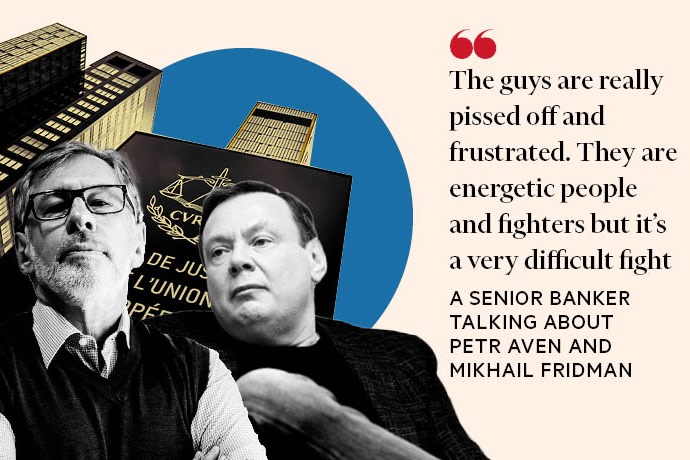
Fridman bought a £65mn property in north London and had received indefinite leave to remain in the UK before losing that status under the sanctions; he was also considering applying for UK citizenship before the war. Aven, on the other hand, houses his £300mn modern art collection in his Surrey mansion and St James pied-à-terre.
For Fridman, establishing himself in London meant he had finally arrived on the world stage, says a former business associate. “Fridman always hated Russia. He couldn’t stand living there. He wanted to get out and move to the west at the first opportunity to do business there,” the person says. “He wants to be a man of the world.”
Yet the UK and EU sanctions have frozen Fridman and Aven’s stakes in their companies and limited their access to funds — although the US has not imposed sanctions on them. The oligarchs have resigned from LetterOne’s board and surrendered control to a team scrambling to save the assets. “Everything which we were building for 30 years is now completely ruined. And we have to somehow start a new life,” Aven told the Financial Times in March.
Alexei Kuzmichev, their partner in LetterOne, was on a skiing holiday in Switzerland in March when the EU put him under sanctions. It left him stranded in the country, unable to rejoin his family in France, but also unwilling to return to Russia, according to two people familiar with the matter.
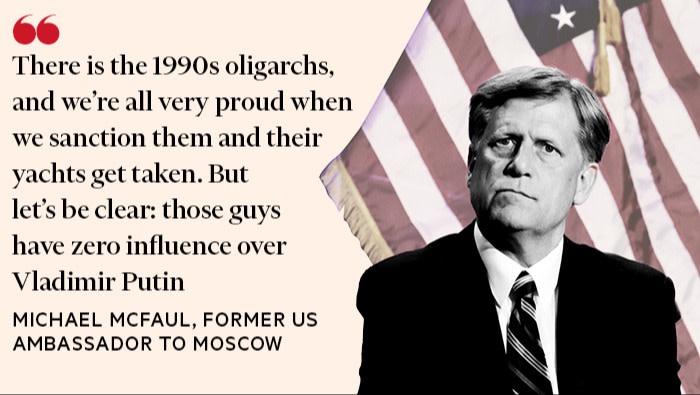
The UK’s National Crime Agency raided Aven’s home in May as part of an investigation into potential sanctions violations over more than £3mn in funds that he transferred to UK accounts from Austria hours before the sanctions came into force. Aven declined to comment on the allegations.
While he appeals against the sanctions imposed on him, Aven has been restricted to spending no more than £2,500 a month on his living expenses, although in July a judge relaxed a freezing order on some of his accounts used to cover bills. Aven’s regular monthly expenditure is £140,000, most of which pays for the upkeep and security of his art collection.
Even for the oligarchs whose energies have been focused on the west, it has been impossible to escape the Kremlin’s eye if they still own a major business in Russia. According to a 2019 report by Department of Justice special counsel Robert Mueller on Russian interference in the US presidential election, Aven said he was one of about 50 oligarchs who took “implicit directives” from Putin at quarterly meetings where they would usually discuss the economy — including ways to keep Alfa-Bank, the bank he co-owns, safe from sanctions.
Aven denies saying Putin ever gave him “implicit directives” and claims the FBI misrepresented what he told them.
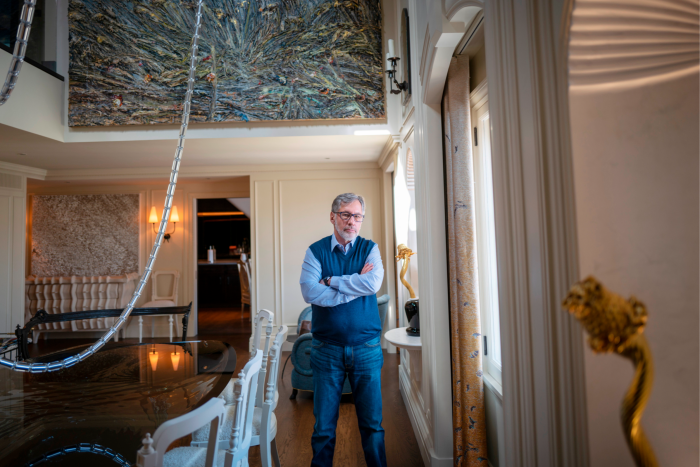
Oligarchs under sanctions who remain outside the country regularly field calls from the Kremlin encouraging them to return home since the invasion, according to two people who have received such calls and several others familiar with the approaches.
Many have also argued that sanctions are pushing them back to Russia. “Some people decide, ‘Do I really need all this? I’ll go back to Moscow where I can happily go around restaurants and feel fine’,” says one businessman. Sanctions, he argues, are forcing elites to become even closer to the Kremlin even if they might prefer to distance themselves from it.
Some people in western policy circles share that scepticism about sanctions. “There are two kinds of oligarchs in Russia,” says Michael McFaul, a former US ambassador to Moscow. “There are the 1990s oligarchs, and we’re all very proud when we sanction them and their yachts get taken. But let’s be clear: those guys have zero influence over Vladimir Putin.”
The typical member of the newer cohort “is a really rich guy and he’s close to Putin, but he’s a really rich guy because he’s close to Putin”, McFaul adds. “So he [also] has no leverage to pressure him to stop the war.”
Speaking out
With their options closed off by the sanctions, the oligarchs feel they are trapped between accepting their fate in Russia or facing reprisal for speaking out against the war.
“They say they are scared of being poisoned, but what they are really worried about losing is their money and reputations” they worked so hard to cultivate, says a senior Russian businessman. “They don’t know how to act in that situation”, the businessman adds. “They are totally disoriented.”
When asked why they had not done more to speak out against the war, several oligarchs pointed to the case of banker Oleg Tinkov. The eccentric tycoon said he was forced to sell his stake in his bank Tinkoff in a “fire sale” in May after denouncing Putin and the “crazy war” on Instagram.
Tinkov told interviewer Yuri Dud that Fridman called him and said: “You’ve really lost your mind. You should have sold first before saying anything.”
For some oligarchs, the incident was a cautionary tale about how denouncing the war could cost them their fortunes. But for Tinkov, speaking his mind freely was more important. “I told him, ‘Misha, I don’t give a shit. This is how I feel. I can’t stay silent.”
Fridman, who declined to comment on the call, has described the war as a “tragedy” but said more explicit criticism would put his employees in Russia at risk.
Most oligarchs have limited their public statements to the EU’s High Court in Luxembourg, where their lawsuits continue to pile up.
“I could do something useful and resist the state takeover of the economy. But I don’t have any assets anymore,” another person who attended the meeting with Putin says. “Now I spend all my time suing the EU.”
The oligarchs suing the EU include former Chelsea FC owner Roman Abramovich and former Arsenal co-owner Alisher Usmanov and individuals with longstanding ties to Putin such as Gennady Timchenko, his billionaire fellow judo enthusiast described by the EU as a “confidant”, and former deputy prime minister Igor Shuvalov.
The Russians who have filed appeals argue that the legal justifications used to impose travel bans and freezes of their assets inside the EU are groundless or flawed.
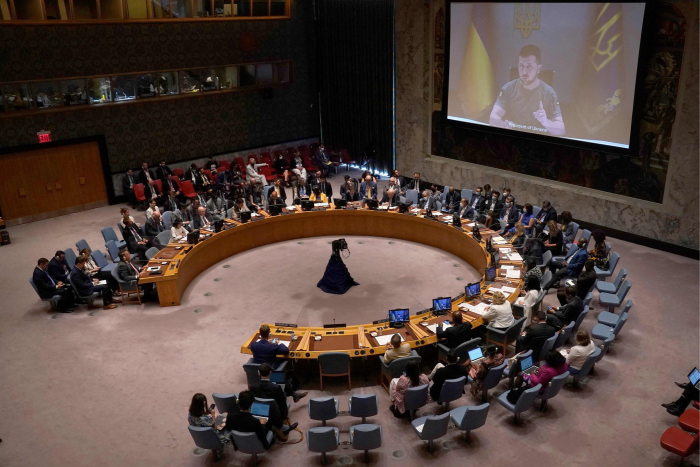
Many of the case files justifying the sanctions provided by the EU, according to documents seen by the FT and people familiar with the matter, appear to be hastily cobbled together from news articles, corporate websites and social media posts.
The intense pressure on the EU and allies such as the US and the UK to move quickly on sanctions after the invasion meant officials had to cut corners while drawing up lists of individuals to be targeted, people involved in the process told the FT.
Now, in many cases, the EU is adding more materials to the files of evidence against individuals who are under sanctions, according to an oligarch who had sanctions imposed on him.
In several cases, the EU cited the taxes paid by Russian companies as a justification for sanctioning their owners on the basis that this helped fund Putin’s war machine. This has outraged some oligarchs, who believe they pay only a tiny fraction of what European countries have spent on Russian oil and gas since the start of the war.
“The EU is helping Putin more than we are,” says one of those challenging their inclusion on a sanctions list. “They should sanction themselves.”
Peter Stano, foreign policy spokesperson for the European Commission, insists the sanctions have been “based on the criteria set out in the relevant sanctions regime, on the available evidence and on the agreement by all member states”.
‘A get out of jail free card’
With the EU court cases likely to drag on for years, however, some oligarchs have embraced the idea of a buyout mechanism — that the tycoons could give up some of their wealth to support Ukraine in exchange for lifting the sanctions.
Apart from Fridman, several other Russian businessmen have also reached out to Kyiv offering a similar quid pro quo, according to people familiar with the matter.
“If you had a rule that they give up 50 per cent [of their wealth] to support Ukraine and they keep the other 50 per cent, every single one of them would come running,” says the senior Russian businessman. “The problem is they have no way out. You need to give them some direction and something to work towards.”
Despite the threat of reprisal, the businessman argues, most oligarchs would leap at the chance to reclaim their funds because “Putin can only offer them something in the future. All they want is to get back the money they had and lost now.”
In Ukraine, however, they face a sceptical audience. Fridman co-owns extensive assets in the country, including mobile operator Kyivstar, one of the country’s largest banks, now called Sense Bank, and a bottled water business.
Even after Russia annexed Crimea from Ukraine in 2014, he continued to visit the country regularly, organising a jazz festival in his native Lviv and funding a memorial to the Babiy Yar massacre of Jews by Nazi Germany in 1941.
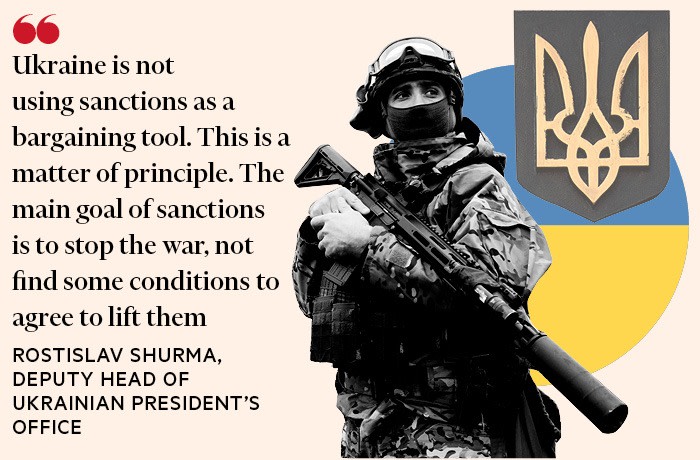
But those contributions have not been enough to win over Ukrainian president Volodymyr Zelenskyy’s office. Ukraine has been open to a plan to recapitalise the bank, but balked at a quid pro quo to lift sanctions on its owners, according to people familiar with the matter.
“Ukraine is not using sanctions as a bargaining tool. This is a matter of principle,” says Rostislav Shurma, deputy head of Zelenskyy’s office. “The main goal of sanctions is to stop the war, not find some conditions to agree to lift them.”
Zelenskyy has said he will only agree if Fridman denounces Putin, speaks out more forcefully against the war and rips up his Russian passport, according to a person close to him.
Fridman denies he ever discussed receiving Ukrainian citizenship with the government.
Some officials have suggested simply confiscating the assets of Russian oligarchs in Ukraine under a law passed in May. Ukraine has so far seized at least $1.1bn from Russian oligarchs, prosecutors said in July.
But there is little sympathy in Kyiv for the plight of the oligarchs. “The 24th, 25th, 26th, 28th of February — that was when it was necessary to determine where you are,” says Oleksiy Danilov, chair of Ukraine’s security council, referring to the very early days of the war. “On the side of light? Or on the side of darkness?”
Additional reporting by Roman Olearchyk and Mehul Srivastava in Kyiv, Henry Foy in Brussels and Ben Hall in London
Comments